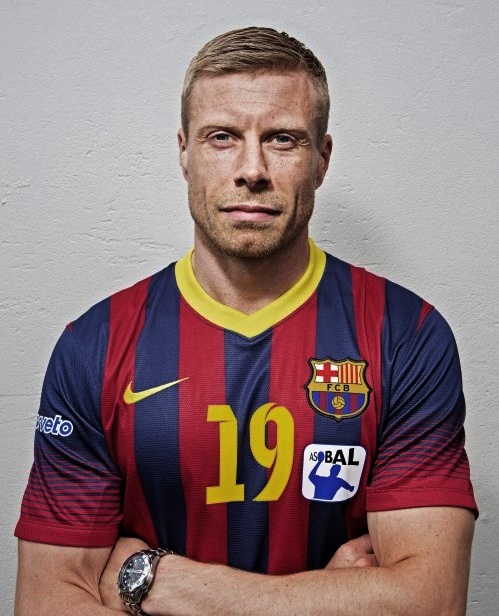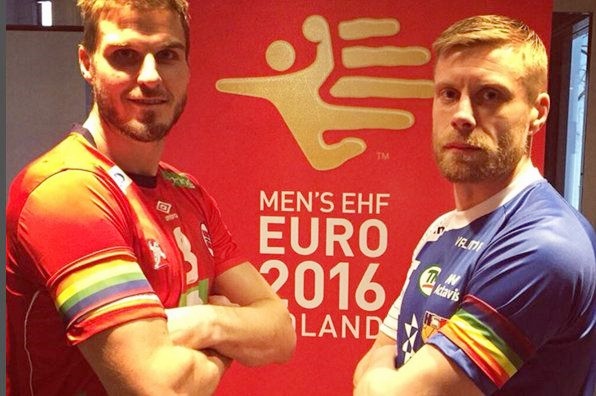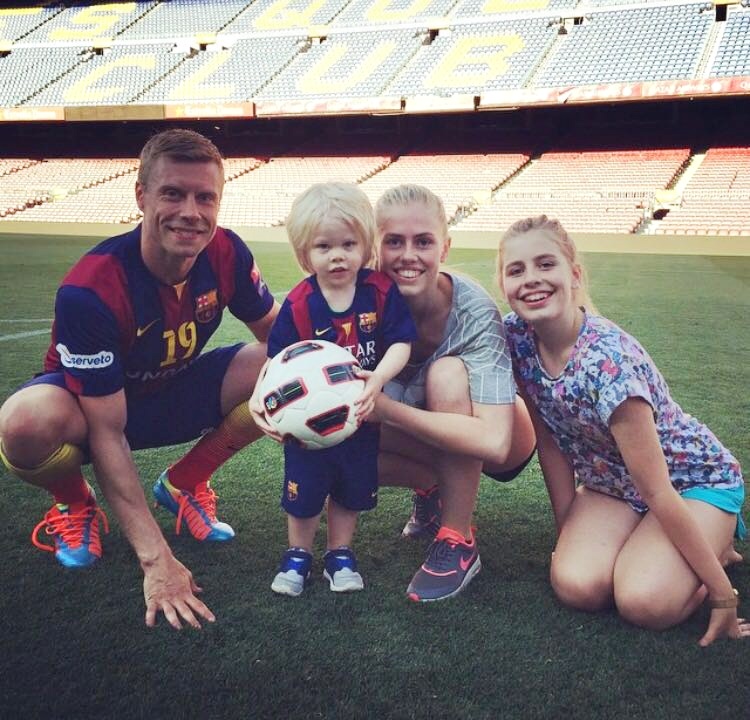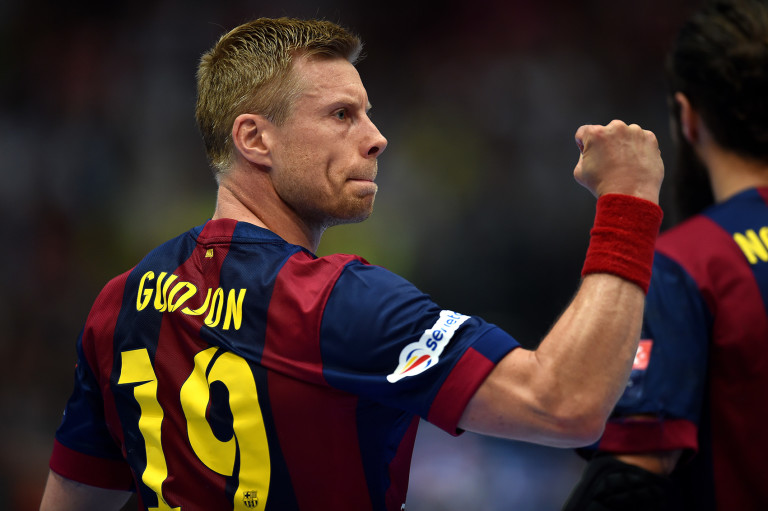Guðjón Valur Sigurðsson, captain of the Icelandic men’s national handball team and player with FB Barcelona Handbol, says that queer education should be part of coaches’ training and integrated in every leader’s learning. And that frankly, players’ sexual orientation shouldn’t be made into an issue at all because it has no effect on the team spirit.
As captain of the Icelandic men’s national handball team and one of the world’s best handball players, currently playing in Spain with FC Barcelona Handbol, Guðjón Valur Sigurðsson is truly a role model for Icelandic youth. Having played for teams in Reykjavík and Akureyri before venturing on a professional career that’s taken him to Germany, Denmark and Spain, Guðjón has years of experience of playing with multi-cultural teams and team mates as diverse as they are many. So what does he think needs to be done to ensure that The National Olympic and Sports Association of Iceland, ÍSÍ ,tackles queer prejudice and bullying within the sports movement in Iceland?

“It’s obviously important that the leaders in the sports clubs show a good example and are well equipped to influence the atmosphere of their teams. If someone wants to come out as gay it’s important what your team is like and the coach of course has to set the tone. So queer education should be e.g. part of coaches’ training to learn how to react to all kinds of situations and first and foremost, how to set a good example and set the right tone in their teams.
But I don’t think it should be made into a big issue because then the spotlight is cast on that one little fact. So that the actuality that someone on the team is gay is never an issue and that he or she doesn’t get attention because they’re a gay athlete but that they get to simply be an athlete. If you’re on the team, it’s simply because you’re good enough – not because you’re gay or straight, white or black.
I’m in a team now with two black guys and one Muslim. That is absolutely no factor in how they’re seen by their team mates. Nobody cares about their skin color, who they pray to or whether they eat pork or not, the only thing that matters is whether they’re good handball players. They’re only judged by their performance. And obviously it should be the same with sexuality. But that isn’t the case and that’s incredibly frustrating and just stupid. I just don’t understand why people’s sexuality has to be an issue, it’s ridiculous!”
“If someone wants to come out as gay it’s important what your team is like and the coach of course has to set the tone. So queer education should be e.g. part of coaches’ training…”
Guðjón Valur says that he thinks it’s weird if gay or queer athletes, especially queer male athletes are being discriminated against, since it seems that it’s accepted that female ball players or athletes are gay. “Personally, I don’t know of any instances where gay male handball players have been discriminated against. But then, I haven’t played with an openly gay team-mate yet so I don’t have first-hand experience of how they’re treated.
But I‘m not so naïve as to think that gay men are simply not interested in sports. I have heard rumors about so and so being gay and – especially abroad – there are stories that some players are closeted gays but put on a show by officially being involved with women.”
Guðjón recalls the case of German football player Thomas Hitzlesperger, “The Hammer”, who came out in January 2014, only after retiring from the sport. Hitzlsperger, who e.g. played for the German national team as well as in the English Premier League, claimed that he had been advised against coming out while still playing for a German club, as people around him thought the reaction would be too harsh. Hitzlsperger has said that the problem isn’t necessarily the dressing room, stating that homosexuality was rarely a big topic there. Guðjón finds that easy to believe. “I think it’s rather the actions of the spectators when you’re playing in front of a massive crowd that might cause players to hesitate to be open about their sexuality. I can easily believe that actually.

I mean, there’s the odd idiot everywhere but when you have thousands of spectators it makes you a little bit more of a target. Because there are things that go down in huge crowds that elsewhere wouldn’t be tolerated.”
Guðjón points out examples from Italy where football matches have been abandoned because of racist abuse from the spectators, to the point where they’ve thrown bananas onto the pitch. “Which is horrible but such is the power of crowd behavior.
He says that however, there’s a huge difference playing before Icelandic spectators compared to the leagues in Germany and Spain, where the arenas are much bigger and therefore much larger crowds watching, not to mention the huge football stadiums abroad with capacities for dozens of thousands of spectators. “I think that Icelandic spectators would rise up against the person who’d be stupid enough to shout homophobic abuse at a player in the field, they’d be told off by others and such behavior wouldn’t be tolerated because it’s such a small crowd and people wouldn’t hesitate to step up.
But in a huge crowd, that’s much more difficult; there’s scope for hooliganism to develop so it’s harder to be an individual who steps up and chastises another spectator. So a huge crowd is more likely to show negativity towards players and having played in front of such a big crowd myself, I can understand why people would choose not to give them more ammunition than necessary.
“…If anything’s going to change, parents are the most important link because as we know … nobody is born with prejudice … Any kind of prejudice starts at home, or at school. It’s not limited to sports because in their purest form, sports are beautiful and noble.”
I’m not rationalizing it or saying it’s an excuse for people having to closet their sexuality, but I can understand why they would, because of this. Then there are simply those who don’t want any attention and prefer not to be openly gay only because of that, they don’t want to be in the spotlight. So if players feel exposed in the field, it’s understandable if they don’t want to make themselves an easier target than necessary.
Going back to what’s going on within a team, well, it all depends on the leaders. If you’ve got good, strong captains, coaches, managers and chairmen, they can set the tone from the start and create an atmosphere in the dressing room that’s not intimidating for anyone to just be who they are.”
A family man with two teenage daughters and a little boy, Guðjón tries to teach his children to value people by who they are, not the colour of their skin, their religion or sexual orientation. But he’s battling the stereotypes.

“My daughter’s been playing football since she was five and I follow her everywhere to watch her play. And I sense this difference in attitude towards girls in sports, they’re always considered weaker, not as fast and boring compared to boys’ sports matches. And I find it so irritating because it’s not true, but we have these stereotypes everywhere. Lesbians are supposedly “strong and masculine” while gay men apparently are “girlie” and all footballers are thought to be “stupid”. But of course you’ll find gay men everywhere, in sports, working as builders, beauticians and everywhere in-between. Same goes for gay women.
It’s so stupid, but if anything’s going to change, parents are the most important link because as we know, nobody is born a racist, nobody is born with prejudice. So that’s where the change has to happen; it’s obvious to me that homophobia and racism don’t start in the dressing room. Any kind of prejudice starts at home, or at school. It’s not limited to sports because in their purest form, sports are beautiful and noble.
In fact, being on a team like this is very much like being in a brotherhood where we go through incredible things together. There can be so much tension and drama, winning titles, losing finals and so on so you have to know that the guy next to you really is by your side and will fight with you. That’s why I judge the next person only by their actions.”
Main photo: Nordic Photos/Getty Images
Other photos: Courtesy of Guðjón Valur Sigurðsson.


